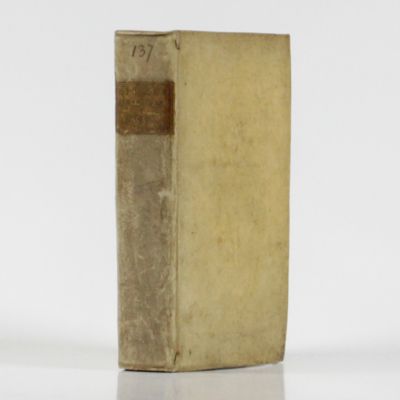Oppian (Oppianus of Corycus)
Oppiano della pesca, ê della caccia tradotte dal Grêco, ê illustrato con varie annotazioni da Antôn Maria Salvani al serenissimo principe Eugênio di Savôja tenêntegenerale Cesareo.
Firênze, Tartini ê Franchi, 1728. 8vo (17.1 x 11.0 cm). Title page in red and black with engraved vignette, xvii, 310, [ii] pp. Contemporary vellum. Spine with morocco label with gilt title.
The first Italian translation of Oppian's work on fishing, originally published in Greek, and translated into Latin in the 16th century. “Oppian of Corycus (or Anazarbus) in Cilicia, who flourished in the reign of Marcus Aurelius (121-180 AD]. According to an anonymous biographer, his father, having incurred the displeasure of Lucius Verus, the colleague of Marcus Aurelius, by neglecting to pay his respects to him when he visited the town, was banished to Malta. Oppian, who had accompanied his father into exile, returned after the death of Verus (169) and went on a visit to Rome. Here he presented his poems to Marcus Aurelius, who was so pleased with them that he gave the author a piece of gold for each line, took him into favor and pardoned his father. Oppian subsequently returned to his native country, but died of the plague shortly afterwards, at the early age of thirty. His contemporaries erected a statue in his honor, with an inscription which is still extant, containing a lament for his premature death and a eulogy of his precocious genius” (Wikipedia). Also included is the first Italian translation of the long poem on hunting, which, however, was written by another man who called himself Oppian (Oppian of Apamea), apparently after the "real" Oppian. This work was "...dedicated to the emperor Caracalla, so that it must have been written after 211. It consists of about 2150 lines, and is divided into four books, the last of which, seems incomplete. The author evidently knew the Halieutica, and perhaps intended his poem as a supplement. Like his namesake, he shows considerable knowledge of his subject and close observation of nature; but in style and poetical merit he is inferior to him. His versification also is less correct" (Wikipedia). Armorial bookplate of Wilmot Earl of Lisburne "Non revertar inultus", and the small coloured bookplate of Alan John Jarvis on the front pastedown, in near mint condition. Dean II, p. 295; Westwood & Satchell, p. 164.




